Interview: Tomihiko Morimi
February 26, 2020 · 0 comments
By Andrew Osmond.
 Penguin Highway, The Night is Short, Walk on Girl, The Tatami Galaxy, The Eccentric Family… All four stem from the imagination of Japanese author Tomihiko Morimi. Until recently, fans who didn’t read Japanese could only know him through the wonderful anime adaptations of his work. In 2019, however, Morimi’s original novels Penguin Highway and Night is Short, Walk on Girl were translated into English, and are available from Yen Press.
Penguin Highway, The Night is Short, Walk on Girl, The Tatami Galaxy, The Eccentric Family… All four stem from the imagination of Japanese author Tomihiko Morimi. Until recently, fans who didn’t read Japanese could only know him through the wonderful anime adaptations of his work. In 2019, however, Morimi’s original novels Penguin Highway and Night is Short, Walk on Girl were translated into English, and are available from Yen Press.
Morimi visited Britain this February, and I interviewed him about his novels and their anime adaptations. The comments below are taken from my interview and also from a public Q&A event held the same day at the Prince Charles cinema on Leicester Square.
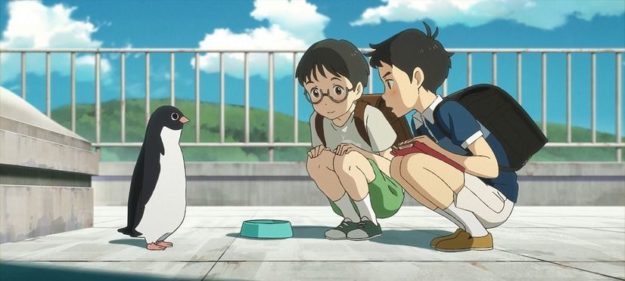 Where did the idea for Penguin Highway start, and did it always involve penguins as opposed to any other creature?
Where did the idea for Penguin Highway start, and did it always involve penguins as opposed to any other creature?
I’d always aimed to write a novel set in a residential suburb, like the one where the main character Aoyama lives, which is where I grew up. I wanted to get the things I used to do back then into this novel.
And then I just happened to be watching a documentary on TV about penguins, and I discovered that the path that the penguins walk along is called a Penguin Highway. I found it a very interesting phrase, for starters, and it stimulated my imagination and I thought, “That’s the title.” So the title came before the actual story.
Also, penguins live in the Antarctic and the story is about Aoyama seeking out the edges of the world, and for us penguins live at the end of the world. So I thought they would be appropriate creatures for Aoyama’s story.
You mentioned the suburb where you grew up. Was that at Ikoma City in Nara prefecture?
Yes. I did used to go exploring around the area, and made a map with my friend. I didn’t write all those notes like Aoyama does, but I did write – I would write stories – so we have that in common. I think I was probably more similar to Aoyama’s friend Uchida.
The only character that I had in my mind from the outset was Aoyama. All the others are sort of built around him. Aoyama thinks very scientifically, so I wanted someone to be more philosophical, so that’s why I gave him Uchida. And then I wanted a sort of female version of Aoyama, so I created Hamamoto. And then I thought what kind of father would a character like Aoyama have…? They all came off from him.
Have you read and enjoyed any Western SF writers, such as Asimov or Heinlein?
The writer who I’ve read most would be Philip K. Dick. I did have in mind Stanislaw Lem’s Solaris [a Polish SF novel, filmed by both Andrei Tarkovsky and Steven Soderbergh.] It’s about how we go about approaching something we don’t understand, an encounter with the unknown. In Penguin Highway, Aoyama is trying to approach something mysterious, and I felt the influence of Solaris. The scene of the “Sea” floating in the field drew on Solaris.
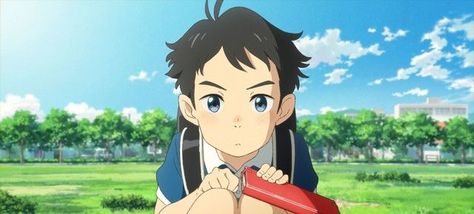 Did you like manga and anime as a kid?
Did you like manga and anime as a kid?
I did like them. I used to like the Dragon Ball and Doraemon movies, and I think I’ve been influenced a lot by Hayao Miyazaki’s work. My favourite Miyazaki film as a child was Laputa, but I liked all of them. After I started writing, I think the one that’s probably had the biggest influence on me was Spirited Away.
In Penguin Highway, I really liked the depiction of the bully Suzuki, who begins as a monster, and then becomes more and more sympathetic through the book.
There was a bully at my primary school, but I was pretty good at avoiding him and making sure I didn’t become a target. But you know the Doraemon films and the character of Gian. In the TV series he’s just a bully, but in the films you would get to see his good side and he would help out Nobita and things like that. Penguin Highway is quite a complicated story, so I was aware of trying to make the characters easier to understand, and familiar characters like people would have seen in the Doraemon films, that’s where Suzuki came from.
Reading Penguin Highway, I thought it could be enjoyed by adults and also by children. Do children read Penguin Highway in Japan?
I hear through signings and similar things that children are reading Penguin Highway. There’s also a separate version for primary-school children. It has the same content but it has some additional notes to explain some of the more complex concepts. But when I was writing the book, I wasn’t really thinking about the age of the readers. It’s not aimed at children, it just happens to have a protagonist who is a child. But obviously children are able to read it and some of them do.
There’s a scene at the very end of the film which differs from the end of the book.
That was an idea from the team who worked on the anime. I didn’t have any input into that ending, but I think it works well for the film. In my book ending, I wanted a particular ordering of the narrative, so I like my ending.
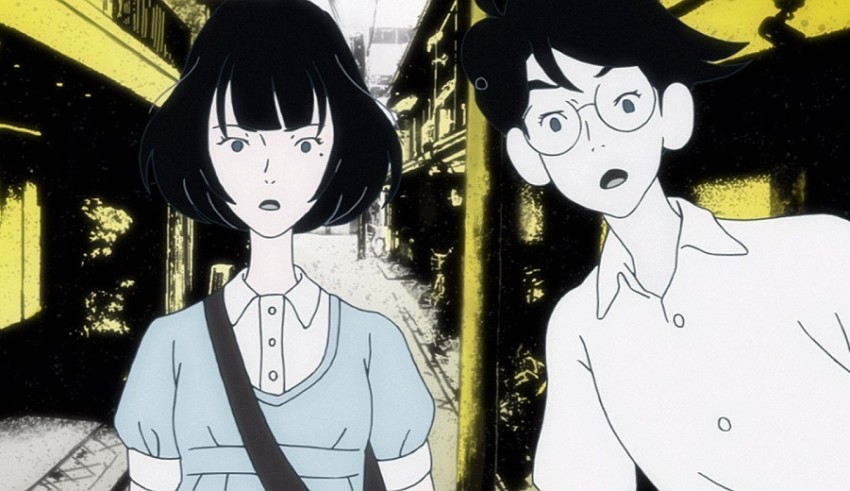 The first anime adapted from one of your books was The Tatami Galaxy, directed by Masaaki Yuasa. How did that come about?
The first anime adapted from one of your books was The Tatami Galaxy, directed by Masaaki Yuasa. How did that come about?
There’s a midnight anime slot, Noitanima. The producer of that came to us and said they wanted to make Tatami Galaxy into an anime and they wanted Yuasa to direct it. That was the first time I’d heard of Yuasa, but then I watched some of his work like Mind Game and I thought this was a very strange style that he had. But Tatami Galaxy was about this “rotten” university student in Kyoto, and it was not so over the top. I thought that Yuasa’s eccentric style combined with that story would be an interesting marriage.
The character designs were by Yusuke Nakamura, who also designed the cover for Night is Short, Walk on Girl. The anime scriptwriter [Makoto Ueda] had a big part to play as well. The novel only features four parallel worlds, but in the anime they had a different world for each episode, so that was a big change. Yuasa had a big hand in that, but there was also a big influence from the scriptwriter in remaking the original.
When Yuasa adapted Night is Short later, there are some crossovers with Tatami Galaxy which are not in the source novel – an appearance by the “Johnny” cowboy, and Ozu from Tatami Galaxy returning in the guise of an infuriating little boy.
That was Yuasa’s idea of fun; it was him messing around, and I didn’t tell him not to. I think it’s fine.
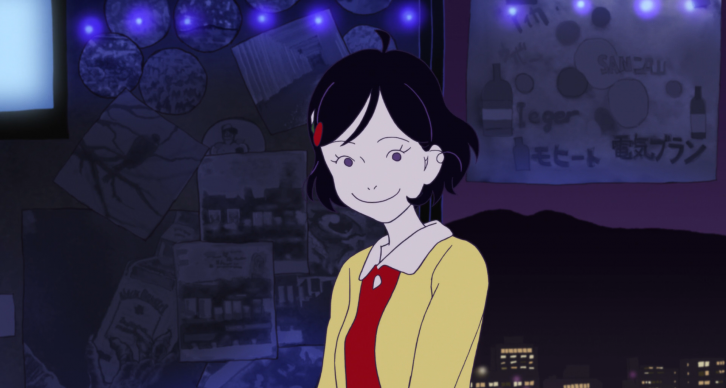 Did you see the Girl character in Night is Short as an idealised fantasy figure, or was she at all inspired by anyone you knew?
Did you see the Girl character in Night is Short as an idealised fantasy figure, or was she at all inspired by anyone you knew?
There was a girl who was the model for the way that she speaks. She would speak in that polite way which I found interesting, and I decided to make use of that. But the Girl herself is not based on her… although she did have dark hair.
Night is Short and some of your other books deal with figures from Japanese folklore, such as tengu or tanuki. Were you interested in them as a child?
I wasn’t really that interested in them as a child. It was when I came to Kyoto and started writing, and I was looking for something to flesh out my work, that I started reading around, reading different things, and I decided I would try elements like tengu and tanuki in my stories.
How did Penguin Highway end up with the Colorido studio and the relative newcomer Hiroyasu Ishida?
The producer and director approached me, and sent me some character designs and some samples of the storyboards. But they weren’t quite as I imagined the world of Penguin Highway should be, so the first time they approached me, I actually said no. The most important thing was Aoyama didn’t really fit with the (albeit vague) image of him I had in my head. But then the director redid the samples and came back to me again. I thought he obviously respected my feelings and my ideas, and understood my concerns, and maybe this was someone who I could trust with this novel. And so I met up with him and decided to let him do it.
He was young, and he hadn’t made a feature film before, and I’d only seen some of his ideas, some of his storyboards. So I was nervous, and I thought: “Would it really be okay?” but he did a really good job.
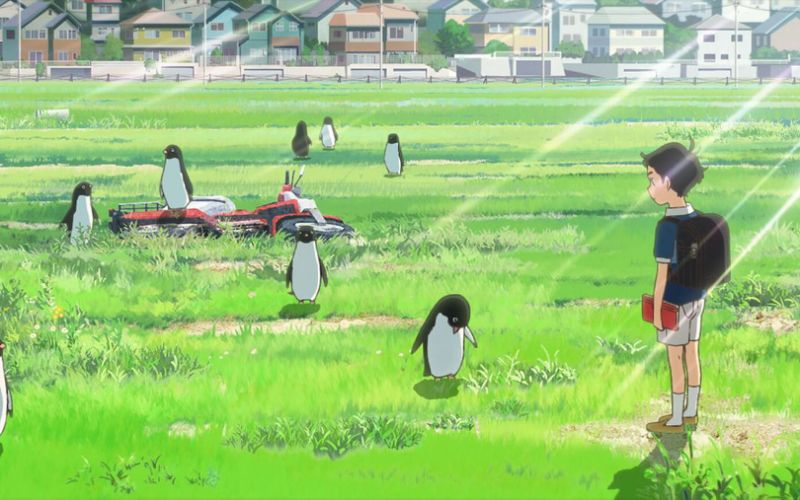 I’m very careful when I choose who I hand over my work to. Most people who want to direct my work, I turn down. But once I’ve decided that I’m going to let them do it, then I don’t interfere, even if what they’re doing is slightly different from the image that I have in my head, or if I feel a bit uncomfortable about it.
I’m very careful when I choose who I hand over my work to. Most people who want to direct my work, I turn down. But once I’ve decided that I’m going to let them do it, then I don’t interfere, even if what they’re doing is slightly different from the image that I have in my head, or if I feel a bit uncomfortable about it.
The film would never match the novel exactly; it’s impossible. But for the most part, I think the Penguin Highway director really respected my work. In fact, in a way I think he respected it too much. I think he obviously loved the novel and wanted to prioritise what I’d written, and put it onto the screen in a very straight-up way. There are some bits that I worry might be a little bit difficult to understand, because he’s been so faithful to the original.
You’ve now had several books adapted as anime by different people. Do you have any comment on their different styles, and do you have a favourite adaptation?
I can’t pick a favourite because I feel bad. I think they’ve all been well-done and successful, so I think I’ve been fortunate. But as the writer of the books, I realise they’re all slightly different. Having written the books, I think I notice and feel the differences more than the average viewer. I can feel the differences between the directors; each of them is different to the original in a different way. Yuasa tends to be more eccentric, more exciting; Masayuki Yoshihara [who directed both TV seasons of The Eccentric Family] goes more down an emotional route; and then with Penguin Highway, it’s very straight, very pure, the director’s vision is very clear. So they’re all different.
Have your books been adapted for other media; for example, the stage?
A few of my stories have become stage plays and radio dramas. None of them have been made into live-action. Maybe they’re more suited to stage and radio than they are to live-action. But if a proposal like that comes along, I usually leave it to the experts; I don’t get involved.
Finally, now two of your novels are available in English, can you say anything about the prospect of more of your writing being translated?
I don’t actually know. There are no plans at the moment, but hopefully if these two books sell well, then my other works will be able to make their way into the English-language world.
Penguin Highway is released in the UK by Anime Limited. Our grateful thanks to the Japan Foundation for making the interview possible.
Leave a Reply